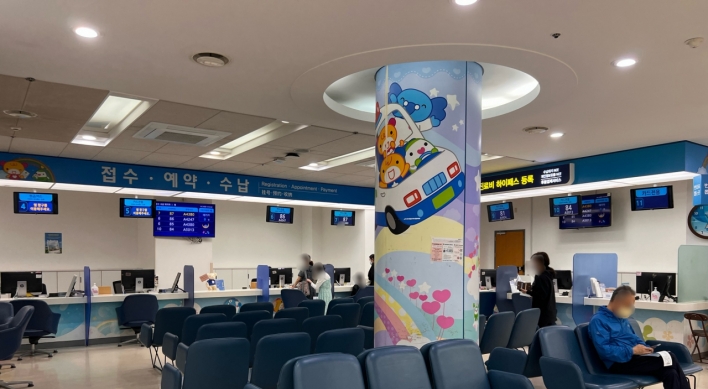Park warns of tougher sanctions against N.K. over possible provocation
By 임정요Published : April 1, 2016 - 10:06
President Park Geun-hye warned North Korea against staging another provocation as she met Thursday with U.S. President Barack Obama and Japanese Prime Minister Shinzo Abe.
North Korea is under growing international pressure to drop its nuclear ambitions after it carried out its fourth nuclear test on Jan. 6 and a long-range rocket launch on Feb. 7.
The U.N. Security Council has imposed the toughest-ever sanctions resolution on North Korea that calls for, among other things, the mandatory inspection of all cargo going into and out of the North, and a ban on the country's exports of coal and other mineral resources to cut off North Korea's access to hard currency.
"I warn once again that the international community will by no means condone North Korea's provocation, and that should it choose to undertake yet another provocation, it is certain to find itself facing even tougher sanctions and isolation," Park said at the trilateral summit, apparently referring to North Korea's possible nuclear test.
North Korean leader Kim Jong-un has said his country will soon conduct "a nuclear warhead explosion test and a test-fire of several kinds of ballistic rockets able to carry nuclear warheads" in defiance of the U.N. sanctions.
South Korea believes the North could conduct a fifth nuclear test at any time.
Park called for the thorough enforcement of the resolution to make North Korea realize that it cannot ensure its own survivability unless it abandons its nuclear aspirations.
North Korea has repeatedly vowed to develop its economy and nuclear arsenal in tandem, a policy Seoul and Washington have said is a dead end for the country.
Obama called for the international community to vigilantly enforce the strong U.N. sanctions.
"We are united in our efforts to deter and defend against North Korean provocations," Obama said. "We recognize that our security is linked, that we have to work together to meet this challenge."
Abe also said the three countries confirmed commitment to strengthen the trilateral cooperation at all levels to cope with the direct and grave threat posed by North Korea's missile and nuclear programs.
Park also said she agreed with Obama and Abe to strengthen efforts to help improve the dismal human rights situation in North Korea.
Obama said that the three countries will work closely together to promote "opportunities and prosperity for the North Korean people who have been suffering so severely because of human rights abuses in North Korea."
In December, the U.N. General Assembly adopted a resolution for the second consecutive year that calls for referring the North to the International Criminal Court for human rights violations.
North Korea has long been accused of grave human rights abuses, ranging from holding political prisoners in concentration camps to committing torture and carrying out public executions.
Still, the North has denied any rights abuses, describing the accusations as a U.S.-led attempt to topple its regime.
Park also said she agreed with Obama and Abe to strengthen cooperation on climate change, counter-terrorism, health care and other global issues.
Park said she expects South Korea, the U.S. and Japan to expand cooperation in eliminating cancers as she welcomed the U.S. anti-cancer initiative.
In February, the White House announced a new $1 billion initiative to identify ways to prevent, diagnose, and treat cancer.
Park also held talks with Chinese President Xi Jinping and expressed her gratitude for the responsible role China has played as one of the five permanent veto-wielding members of the U.N. Security Council.
China, the North's last major ally and economic benefactor, has voted in favor of the toughest U.N. sanctions and vowed to strictly enforce them, in a sign of departure from its previous reluctance to put pressure on North Korea.
China has long been worried that tougher measures against North Korea could destabilize its communist neighbor and trigger an influx of North Koreans across the porous border.
Obama said before a bilateral meeting with Xi that the two leaders are committed to the denuclearization of the Korean Peninsula and the full implementation of the U.N. sanctions.
"We want to enhance communication and coordination on the Korea nuclear issue and other regional and global issues," Xi said.
The back-to-back summits come on the margins of the two-day Nuclear Security Summit meant to discuss how to tackle the threats of nuclear terrorism and how to strengthen an international regime for nuclear security.
The nuclear summit has been held every two years since Obama hosted the inaugural summit in 2010 as part of efforts to make the world free of nuclear weapons. This year's meeting is to be the final summit.
"North Korea's denuclearization is an essential task to enhance nuclear security in the international community as well as on the Korean Peninsula and in the Northeast Asia," Park said during a working dinner with Obama, Xi and dozens of other leader on Thursday, the first day of the summit. (Yonhap)






![[Grace Kao] Hybe vs. Ador: Inspiration, imitation and plagiarism](http://res.heraldm.com/phpwas/restmb_idxmake.php?idx=644&simg=/content/image/2024/04/28/20240428050220_0.jpg&u=)
![[Herald Interview] Mom’s Touch seeks to replicate success in Japan](http://res.heraldm.com/phpwas/restmb_idxmake.php?idx=644&simg=/content/image/2024/04/29/20240429050568_0.jpg&u=)


![[News Focus] Lee tells Yoon that he has governed without political dialogue](http://res.heraldm.com/phpwas/restmb_idxmake.php?idx=644&simg=/content/image/2024/04/29/20240429050696_0.jpg&u=20240429210658)








![[Today’s K-pop] Seventeen sets sales record with best-of album](http://res.heraldm.com/phpwas/restmb_idxmake.php?idx=642&simg=/content/image/2024/04/30/20240430050818_0.jpg&u=)